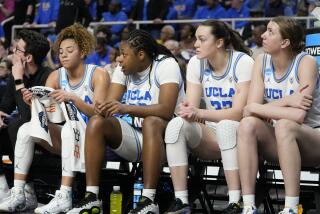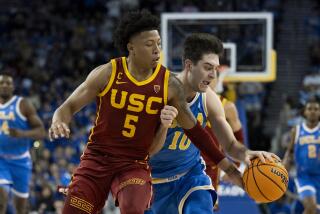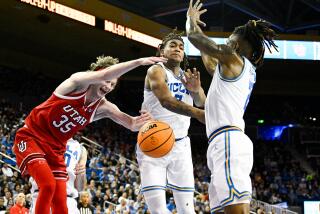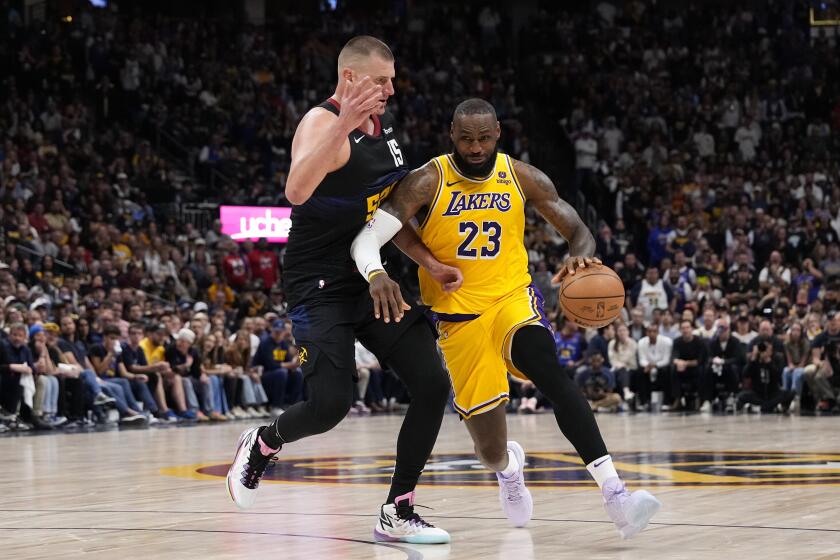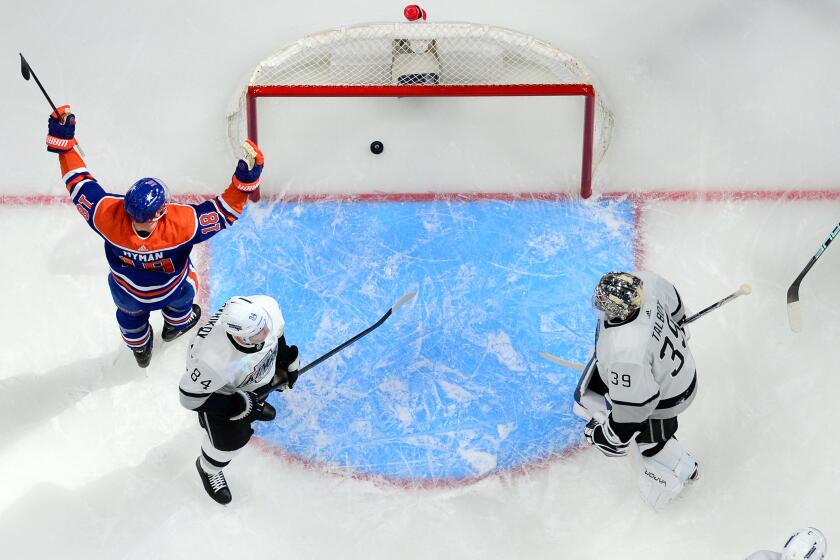UCLA basketball’s fresh start hits sour notes
It’s nearly midnight on a rainy Wednesday, and Ben Howland is sitting in the only part of new Pauley Pavilion that is not spacious and sparkling.
The coaches’ locker room.
That’s right, in the only place in this basketball palace that Howland can hide, he can barely fit, with six coaches crammed into a dressing space the size of a large closet.
It’s an appropriate metaphor that is not lost on a UCLA basketball boss whose once stern expression has been softened into a perpetual look of weariness. Howland carefully folds and places his coat on a chair, squeezes into the corner on another chair, runs his hand through his thinning hair, and sighs.
“This is a tough business I’m in,” he says. “I understand that without any question.”
There was a time when it felt as if the business of running the Bruins had never been better. But less than a month into a season filled with needless drama and youthful despair, it has clearly never been tougher.
After recruiting an all-star team that was supposed to save his job, Howland has watched that team stumble and split to the point where it could eventually cost him his job.
On the court, the blue chippers have already turned red by losing to Cal Poly San Luis Obispo and being forced into overtime by UC Irvine. Off the court, they have lost something even more important than games — two former talents have left the team, most notably and recently giant prodigy Joshua Smith.
What was supposed to be a grand march to the Final Four has turned into an awkward nightly shuffle of uncertainty, flashy stars trying to learn a gritty system with a depleted bench and a vein-popping head coach who is running out of time.
“Well, it hasn’t been fun around here the last few days, that’s for sure,” says Howland.
The new Bruins issues have resurrected old Howland criticisms that he is a coach unable to connect with his kids and unwilling to change his style to fit their talent. Those charges were once muted by three consecutive Final Four appearances, but that seems ages ago, and if he doesn’t win big with four of the most highly touted recruits in the country, then he’s in big trouble, and he knows it.
“No question we have to have success this year,” he says. “We have to go to the tournament and do well.”
And if they don’t, Athletic Director Dan Guerrero will have to decide whether Howland is worth the empty seats on the bench and the still-empty seats in new Pauley, which was only half full during Wednesday’s 82-56 victory over Cal State Northridge.
By the way, you know the single gold seat that has been designated to commemorate where Coach John Wooden used to sit after his retirement? In new Pauley, it’s actually on the other side of the arena from where he really sat. Yeah, right now, everything over there is sort of turned around.
The latest problems start with Smith, who three seasons ago was one of the country’s top big-man prospects and the heavyweight centerpiece of Howland’s recruiting efforts. But the coach could never get the kid to slim down and get in shape. On Wednesday, three days after Smith was embarrassed by an airball layup against Cal Poly, he walked into Howland’s office and quit.
“I was surprised, shocked,” says Howland. “I really didn’t think this was going to happen.”
The real surprise was Howland’s shock. That only confirms the perception that has plagued him since he replaced Steve Lavin before the 2003-04 season. There is a belief that he isn’t close to the players, that he is a great coach but a distant mentor, that his influence is huge on the court and invisible elsewhere.
Although this season’s other defector, Tyler Lamb, wanted more playing time, there have been several others who left the program in recent years simply because, like Smith, they needed special attention that Howland couldn’t give them. There were the transfers who were successful elsewhere, like Mike Moser, Drew Gordon and Chace Stanback. There were the underclassmen who turned pro too early only because they didn’t like hanging around Howland’s team, guys like Tyler Honeycutt and Malcolm Lee. Then there was Trevor Ariza, who perhaps set the tone when he left UCLA after Howland’s first season even though he would be a second-round draft pick who required several NBA seasons to reach his potential.
Among all these, Smith, whose father, Josh, refused comment when I called him Wednesday, seemed to be a clear Howland failure.
“Yes, absolutely, I feel like I couldn’t help him do a better job in helping him with his condition,” Howland says. “I feel terrible about that. I’m just sad and disappointed.”
You have to wonder, if Smith was that surprisingly unhappy, who else might be? The Bruins’ four nationally celebrated recruits came here to run and have fun, yet the Bruins have scored 70 points or fewer in three of their seven games.
Kyle Anderson did not make a basket against either Georgetown or Cal Poly. Tony Parker, who missed most of the Northridge game because of a foot injury, had been averaging eight minutes and four points. Only Shabazz Muhammad and Jordan Adams seemed to be playing with freedom, but that freedom has been limited by Howland’s patience.
“We want to run, but we have to be good decision-makers in the end and not force the issue,” says Howland. “We’ve got to get everybody to sacrifice, be on same page, be a team.”
Um, Coach? I think these kids came here to run, period. That’s what they do in AAU. That’s what John Calipari does at Kentucky, rolling the ball out there and letting his kids fly, a style that was heavily criticized until it won a national championship. Maybe in this day of one-and-done players, that’s the only way to coach? Unless Howland has another Lorenzo Mata or Alfred Aboya stashed in that tiny coaches’ locker room, he’s going to have a heckuva challenge teaching sacrifice.
“I promise you, I’m going to coach my tail off to get us to the next level,” says Howland.
I believe him. I just don’t know if I believe that this time, in this environment, it’s going to work.
twitter.com/billplaschke
More to Read
Get our high school sports newsletter
Prep Rally is devoted to the SoCal high school sports experience, bringing you scores, stories and a behind-the-scenes look at what makes prep sports so popular.
You may occasionally receive promotional content from the Los Angeles Times.
